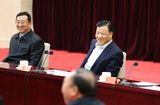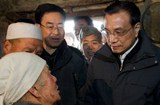Protecting Overseas Interests
With the gradual integration of China's economy into the world economic system, overseas interests have become an integral component of China's national interests. Security issues are increasingly prominent, involving overseas energy and resources, strategic sea lines of communication (SLOCs), and Chinese nationals and legal persons overseas. Vessel protection at sea, evacuation of Chinese nationals overseas, and emergency rescue have become important ways and means for the PLA to safeguard national interests and fulfill China's international obligations.
In line with the relevant resolutions of the United Nations Security Council (UNSC), and with the consent of the Transitional Federal Government of Somalia, the Chinese government dispatched a combined naval task force to conduct escort operations in the Gulf of Aden and waters off Somalia on December 26, 2008. The combined Chinese task forces are mainly charged with safeguarding the security of Chinese ships and personnel traversing those waters and the security of ships delivering humanitarian supplies for the World Food Programme (WFP) and other international organizations, and sheltering passing foreign vessels as far as possible. As of December 2012, the Chinese Navy has dispatched, in 13 task groups, 34 warships, 28 helicopters, and 910 Special Operations Force (SOF) soldiers, escorting 4,984 ships in 532 batches. Among them, 1,510 were Chinese mainland ships, 940 Hong Kong ships, 74 Taiwan ships and one Macao ship. The task forces also rescued two Chinese ships from pirates who had boarded them and 22 which were being chased by pirates.
In February 2011, the turbulent situation in Libya posed grave security threats to Chinese institutions, enterprises and nationals in that country. The Chinese government organized the largest overseas evacuation since the founding of the PRC, and 35,860 Chinese nationals were taken home. The PLA contributed ships and aircraft to the effort. The Chinese Navy' s frigate Xuzhou, on escort mission in the Gulf of Aden and waters off Somalia at that time, sailed to the waters off Libya and provided support for ships evacuating Chinese nationals stranded there. The PLAAF sent four aircraft at short notice, flew 40 sorties, evacuated 1,655 people (including 240 Nepalese) from Libya to Sudan, and took 287 Chinese nationals from Sudan back home.
V. Safeguarding World Peace and Regional Stability
China's security and development are closely connected with the peace and prosperity of the world as a whole. China's armed forces have always been a staunch force upholding world peace and regional stability, and will continue to increase cooperation and mutual trust with the armed forces of other countries, participate in regional and international security affairs, and play an active role in international political and security fields.
Participating in UN Peacekeeping Operations
China earnestly fulfills its international responsibilities and obligations, and supports and actively participates in UN peacekeeping missions. In accordance with UN resolutions as well as agreements between the Chinese government and the UN, China dispatches peacekeeping troops and specialized peacekeeping personnel to designated countries or regions, who carry out peacekeeping operations under the auspices of the UN. They are mainly tasked with monitoring ceasefires, disengaging conflicting parties, providing engineering, transportation and medical support, and participating in social reconstruction and humanitarian assistance.
In 1990, the PLA sent five military observers to the UN Truce Supervision Organization (UNTSO) - the first time China had taken part in UN peacekeeping missions. In 1992, it dispatched an engineering corps of 400 officers and men to the UN Transitional Authority in Cambodia (UNTAC) - the first time China had sent an organic military unit on a peacekeeping mission. To date, the PLA has dispatched 22,000 military personnel to 23 UN peacekeeping missions. All of them have been awarded the UN peace medals. Three officers and six soldiers have laid down their lives performing such duties and were posthumously awarded the Dag Hammarskjold medal. So far, China is the biggest troop and police contributor among the five permanent members of the UN Security Council. It also dispatches the most numbers of troops for engineering, transportation and medical support among all the 115 contributing countries. China pays and contributes the largest share of UN peacekeeping costs among all developing countries.
As of December 2012, a total of 1,842 PLA officers and men are implementing peacekeeping tasks in nine UN mission areas. Among them, 78 are military observers and staff officers, 218 are engineering and medical personnel for the United Nations Organization Stabilization Mission in the Democratic Republic of the Congo (MONUSCO), 558 are engineering, transportation and medical personnel for the United Nations Mission in Liberia (UNMIL), 335 are engineering and medical personnel for the United Nations Interim Force in Lebanon (UNIFIL), 338 are engineering and medical personnel for the United Nations Mission in the Republic of South Sudan (UNMISS) and 315 are engineering personnel for the African Union/United Nations Hybrid Operation in Darfur (UNAMID).
Tough, brave and devoted, Chinese peacekeepers accomplish all their tasks in an exemplary manner. Over the past 22 years, Chinese peacekeepers have built and repaired over 10,000 km of roads and 284 bridges, cleared over 9,000 mines and various types of unexploded ordnance (UXO), transported over one million tons of cargo across a total distance of 11 million km and treated 120,000 patients. The staff officers and military observers have displayed a high degree of professionalism in their work at the headquarters and in the tasks of patrol, ceasefire monitoring, liaison and negotiation. The Chinese engineering units to the Democratic Republic of the Congo worked day and night to level an area of 16,000 square meters littered with volcanic rocks. The Chinese transportation units to Liberia have worked throughout the country and served as the transportation support center for nearly 50 peacekeeping troops there. Chinese peacekeepers also build roads and bridges, repair vehicles and transport materials for, as well as deliver medical assistance and impart agricultural technology to local people. The Chinese engineering units to Lebanon invented the method of "tilted cross positioning" in minesweeping, which has greatly raised the safety and efficiency of such operations. They can now cover an average of over 500 square meters per day with this method. During the Lebanon-Israel conflict in 2006, over 3,500 unexploded bombs were defused and disposed of. The Chinese engineering units to Darfur, Sudan, dug 13 wells in areas where well digging was deemed impossible. The Chinese engineering units to South Sudan built the first interim training center for Disarmament, Demobilization and Reintegration (DDR) at a high standard, making a positive contribution to the local peace process.
Chinese peacekeepers strictly abide by the code of personal conduct for UN peacekeepers, rules of engagement and laws of host countries. They respect local religious beliefs and customs, and conscientiously observe the mission regulations and rules for the Chinese peacekeeping troops, thereby winning trust from the local people.
 |  |

 分享到人人
分享到人人 分享到QQ空间
分享到QQ空间














 回访和习近平握手渔民
回访和习近平握手渔民















